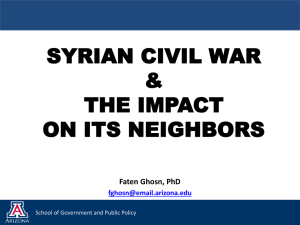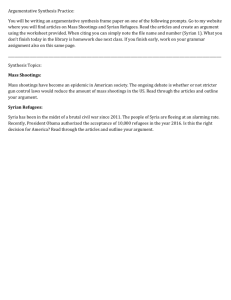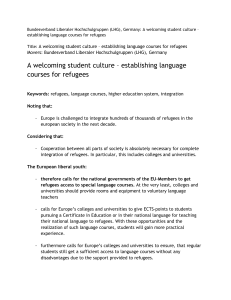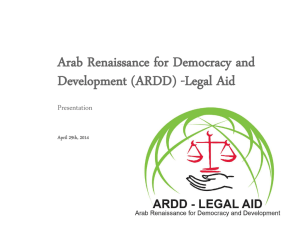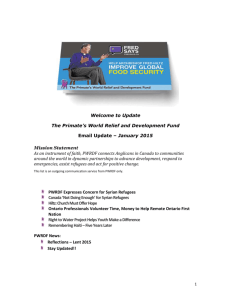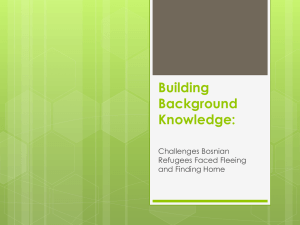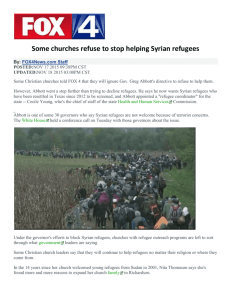this questions and answers document
advertisement
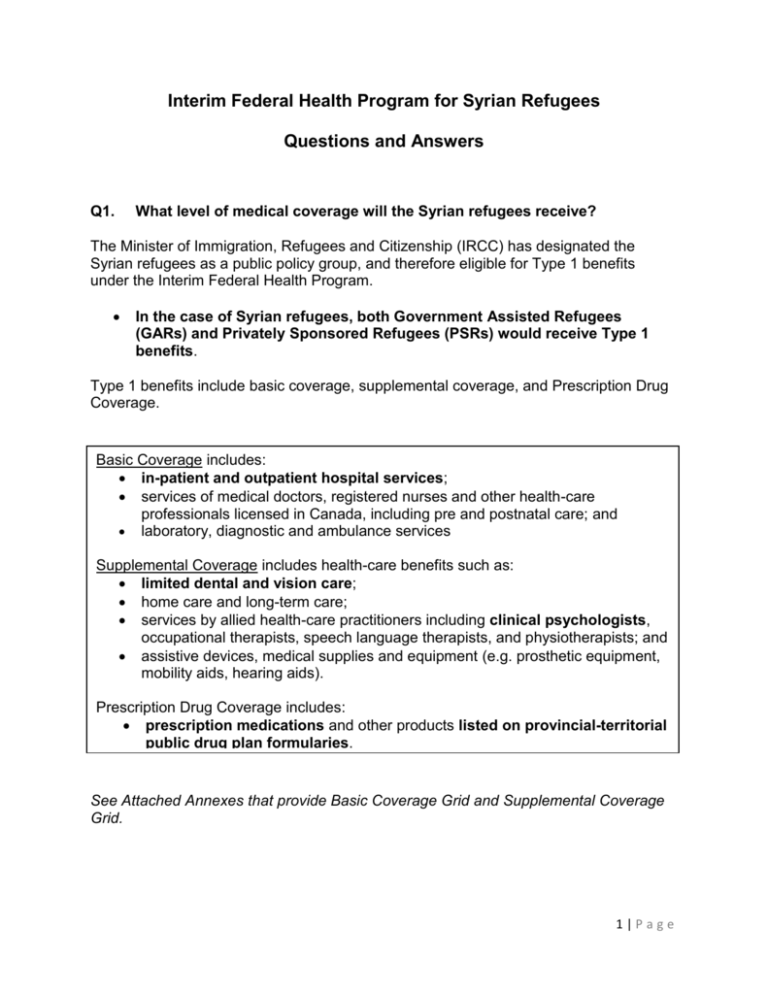
Interim Federal Health Program for Syrian Refugees Questions and Answers Q1. What level of medical coverage will the Syrian refugees receive? The Minister of Immigration, Refugees and Citizenship (IRCC) has designated the Syrian refugees as a public policy group, and therefore eligible for Type 1 benefits under the Interim Federal Health Program. In the case of Syrian refugees, both Government Assisted Refugees (GARs) and Privately Sponsored Refugees (PSRs) would receive Type 1 benefits. Type 1 benefits include basic coverage, supplemental coverage, and Prescription Drug Coverage. Basic Coverage includes: in-patient and outpatient hospital services; services of medical doctors, registered nurses and other health-care professionals licensed in Canada, including pre and postnatal care; and laboratory, diagnostic and ambulance services Supplemental Coverage includes health-care benefits such as: limited dental and vision care; home care and long-term care; services by allied health-care practitioners including clinical psychologists, occupational therapists, speech language therapists, and physiotherapists; and assistive devices, medical supplies and equipment (e.g. prosthetic equipment, mobility aids, hearing aids). Prescription Drug Coverage includes: prescription medications and other products listed on provincial-territorial public drug plan formularies. See Attached Annexes that provide Basic Coverage Grid and Supplemental Coverage Grid. 1|Page Q2. How long will the Syrian refugees be covered under the Interim Federal Health Program? Coverage will be for up to a year, starting immediately upon arrival at point of entry. Once a refugee is eligible for coverage under a provincial or territorial health plan, basic health care coverage under the Interim Federal Health Program would cease. However, the Supplemental and Prescription Drug Coverage would continue for up to one year. Q3. Will Syrian refugees have access to mental health services under the IFHP? All Syrian refugees will receive Type 1 benefits which includes Supplemental Coverage. Supplemental coverage includes psychotherapy counselling or psychology counselling in a private clinic or addiction centre, for a maximum of 10 sessions. (See Supplemental Coverage Grid). Q4. How does IRCC ensure that refugees are able to access registered providers in their new communities? Prior to settling Government Assisted Refugees, IRCC will ensure that adequate settlement support is in place, including access to a registered health care provider. TO BE CONFIRMED BY IRCC In the case of privately sponsored refugees, sponsors themselves are responsible for determining that adequate resources are available and for sharing pertinent information with refugees. Information is available on IRCC’s website at www.cic.gc.ca/ifhp for both beneficiaries and providers. In the case of health care providers, the website includes instructions on how to become registered with the Program, how to determine eligibility and how to submit a claim. In addition, Medavie Blue Cross maintains a list of registered providers on their website at http://www.ifhp-pfsi.ca so that private sponsors, clients and others stakeholders can readily identify providers in their community. 2|Page Q5. How do Syrian refugees receive services under the Interim Federal Health Program once they are settled in a community? Refugees would seek services from a medical service provider registered with the Interim Federal Health Program. The registered medical service provider would then be responsible for seeking reimbursement from the claims administrator for the Program, Medavie Blue Cross. Refugees do not pay for such services out of pocket. Q6. How many health care providers are currently registered under the IFHP? Medavie Blue Cross maintains a list of registered providers on their website at http://www.ifhp-pfsi.ca so that private sponsors, clients and others stakeholders can readily identify providers in their community. The list of providers (http://www.ifhp-pfsi.ca) is sub-divided by province and territory and is current as of October 2, 2015. Q7. If a health care provider is interested, how can they register with the IFHP? Information is available on IRCC’s website at www.cic.gc.ca/ifhp for both beneficiaries and providers. In the case of health care providers, the website includes instructions on how to become registered with the Program, how to determine eligibility and how to submit a claim. Interested health care providers can register by filling out a registration form and agreeing to the terms and conditions. These registration forms and contact information on how to submit the forms can be found on the Medavie Blue Cross website at: https://www.medavie.bluecross.ca/cs/BlobServer?blobcol=urldata&blobtable=MungoBlo bs&blobheadervalue2=abinary%3B+charset%3DUTF-8&blobheadername2=MDTType&blobkey=id&blobwhere=1187212169838&blobheader=application%2Fpdf A copy of the registration form for health care providers has also been included for information. Health providers are also able to verify a patient’s IFHP coverage. This includes accessing a secure section of the provider web portal 3|Page (https://provider.medavie.bluecross.ca/) or by calling Medavie Blue Cross at 1-888-614-1880 (08:30 to 16:30 in each Canadian zone) to verify a patient’s coverage. Q8. What happens with Syrian Refugees who may be staying in temporary accommodations? Depending on the number of refugees housed in temporary accommodations, they may receive health care services from teams of health professionals coordinated by the Public Health Agency of Canada at “mini-clinics” supported by resources from the Agency’s National Emergency Strategic Stockpile. If there are very few numbers or if more complex health services are required, this would be accessed from providers in the community. For example those that require hospitalization, or emergency dental services, refugees would be transported to nearby facilities. In these cases, costs would be covered on a fee for service basis through the Interim Federal Health Program. 4|Page
